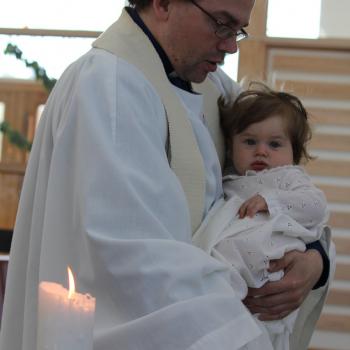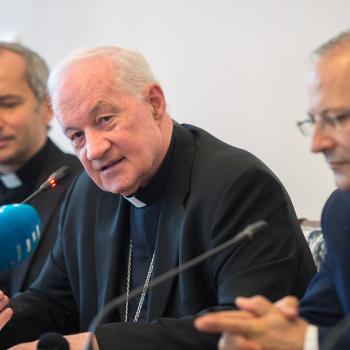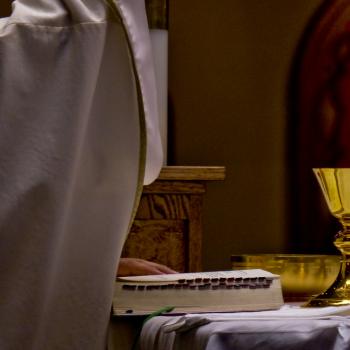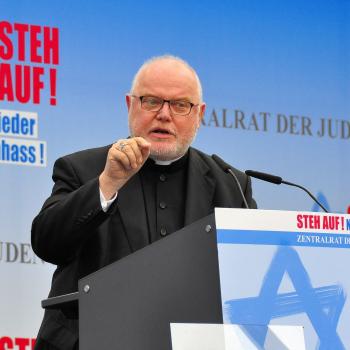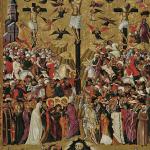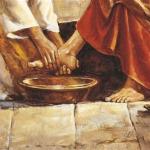“The Polish revolt against Pope Francis: the racist drift of the bishops of Warsaw”, screamed Tiscali. “The Polish Church is on a dangerous path, supporting the government and forgetting the Pope”, echoed Famiglia Cristiana. A week after the scandalous “Rosary to the Borders” event in Poland, in which nearly a million Catholics lined up along the country’s borders to pray this Marian prayer, here we take a look under the surface of what seems to this writer and to many others to have been nothing more than a blasphemous and xenophobic protest against refugees and migrants.
The demonstration
First, some more facts. As Carlo di Cicco in Tiscali recalls, on October 7 – the anniversary of the decisive victory of the Catholic forces against the Muslims at the Battle of Lepanto, in 1571 – close to a million Polish faithful stood along the 3,500 kilometres of the Polish border to pray the rosary “for peace, and to safeguard the homeland and the rest of Europe from secularization and especially from Islamization”.
“An articulate and pompous way”, this slogan, “to conceal the true goal”, continues di Cicco. “A demonstration against immigrants and refugees who, as Muslims in their majority, are invading Europe – according to the singular Polish mindset – and endangering the Catholic identity of the continent and of the country itself”. A demonstration in which not only this racism but also a deep papophobia in the person of Pope Bergoglio made itself felt. A protest all the more scandalous due to the fact that 22 out of the 42 Polish dioceses took part in “an initiative that flies in the face of Francis’s continued and frank commitment to welcoming refugees and immigrants in need”, and, just as incredibly, was supported not only by the Polish government but also by the bishops’ conference, the powerful traditionalist radio station Radio Maria and Polish public television.
The offence to Pope Francis
The affront to Pope Francis would be scandal enough. Di Cicco echoes the worries of a minority of progressive lay Catholics who are “enthusiastic about Pope Francis but are concerned about the adroitness with which many priests and bishops [in Poland] agree to agree with Francis but then preach and work against his pastoral and doctrinal directives”. Hiding themselves behind “a fake concern that the best thing to do is to help the refugees at home”, and with this alibi allowing themselves – and their rosary protest – to have been “clearly and easily instrumentalized” by an aggressively xenophobic government.
The Pope may want to “highlight the need to move from a Church that celebrates the battle of Lepanto to a Church that clearly and always shows the mercy of God” – and that “with all the consequences… for the traditional relations [of the Church] with political and economic power”. But by disobeying the Pope a great part of the Polish Church “has been deceived by the ‘enemy’ voices of the politicians who rule in Poland, according to which every refugee and every migrant is a terrorist”, according to Bishop Tadeusz Pieronek, the secretary of the Polish Bishops’ Conference in the 1990s and a member of the commission that wrote the post-communist constitution.
The “instrumentalization” of the event by the government
Writing in Settimana, Bishop Pieronek denounced the fact that “some participants in the rosary prayer – perhaps unaware of what they were doing – shouted not to let the refugees enter Poland. This anti-Christian attitude was welcomed with gratitude by the government as it confirms the rightness of its persistence not to accommodate refugees. In fact, until now, neither a refugee nor a needy migrant has been welcomed in Poland. Deplorable, but true”.
The prelate also explained his views on the rosary crusade in an interview with Famiglia Cristiana, a magazine that describes him as “a kind of critical conscience of the Polish Church”, and in which the prelate denounced that although “the Rosary is a beautiful prayer, the bishops did not predict or understand in time that it could be used as an ideological weapon by government propaganda”.
“Today in Poland everything is transformed into politics by the government, and by the media that are practically all controlled by the government, which is against the reception of refugees and immigrants. That the Church was not aware of this was at least a very serious naivety”, alleged Pieronek, adding that the “Rosary to the Borders” event has had the effect of raising at least a spiritual wall against immigrants and against the rest of Europe. “… [I]t is clear that all the Poles who participated in the Rosary are against the thought and the teaching of Pope Francis. Unfortunately. In Poland, a battle is under way to persuade people that every refugee is an outlaw who is trying to destroy Polish identity and who is a serious and real threat to the health and life of Poles”.
The “Rosary to the Borders” event as a threat to democracy
But why this connivance between the Polish Church and State on at least the matter of immigration: a cosiness that according to the bishop has seen at least one Polish minister explicitly state “that in this specific case [of welcoming refugees and migrants] the Pope is wrong”? Pieronek explained that the Church supports the government – apart from isolated critical voices – because “the bishops feel that with this government, which declares itself faithful to the Church, it is easier to convert people. But unfortunately, it’s not true”.
Fortunately not all Poles agree with either the government or the Church’s policies on immigration, according to the bishop. “In Poland every day there are demonstrations against government decisions and the laws that the Parliament approves”, he pointed out. But that doesn’t mean there aren’t still causes for grave concern. The recent education reform, for example, which has seen figures not only of the likes of Charles Darwin but also those of Lech Walesa and the Solidarnosc experience disappear from textbooks.
“School reform is a tragic thing that brings us back to the times of the communist regime”, lamented Bishop Pieronek. “I remember those years, when the Communists changed their reading of history. Today, the Polish ruling party, the PiS, an acronym of ‘Law and Justice’, is behaving in the same way, wiping out the recent history of Poland”.
A sobering warning
Not only education, though, but also the very foundations of democracy in Poland are under threat, as the “Rosary to the Borders” event has shown. “I wonder with concern at how far the government will dare to push”, said Pieronek. “In words, the government says it wants to stay in Europe. In reality, it does everything to get out of it”.
“[I worry about] democracy”, continued the prelate. “Every day we see that the government tries to dismantle one more piece of democracy. Everything is organized to counter and to overcome liberal democracy with the goal of achieving a sort of populist democracy. The direction in which the government has gone is bringing Poland back to the times of the communist regime”.
A sobering warning for Catholics in Poland and those who, throughout Europe, would follow in the footsteps of the organizers of the racist “Rosary to the Borders” event. In the words of Bishop Pieronek, such intimacy with the temporal powers, and such disregard for the concerns of the Pope and of our common humanity – refugees or not – are “a dangerous path” indeed.







